Related Research Articles
Faces are an English rock band formed in London in 1969 by members of Small Faces after lead singer and guitarist Steve Marriott left to form Humble Pie. The remaining Small Faces—Ian McLagan (keyboards), Ronnie Lane, and Kenney Jones —were joined by guitarist Ronnie Wood and singer Rod Stewart, both from the Jeff Beck Group, and the new line-up was renamed Faces.
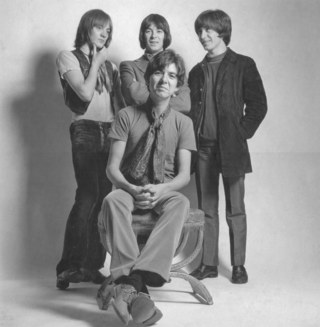
The Small Faces were an English rock band from London, founded in 1965. The group originally consisted of Steve Marriott, Ronnie Lane, Kenney Jones and Jimmy Winston, with Ian McLagan replacing Winston as the band's keyboardist in 1966. The band were one of the most acclaimed and influential mod groups of the 1960s, recording hit songs such as "Itchycoo Park", "Lazy Sunday", "All or Nothing" and "Tin Soldier", as well as their concept album Ogdens' Nut Gone Flake. They evolved into one of the UK's most successful psychedelic bands until 1969.
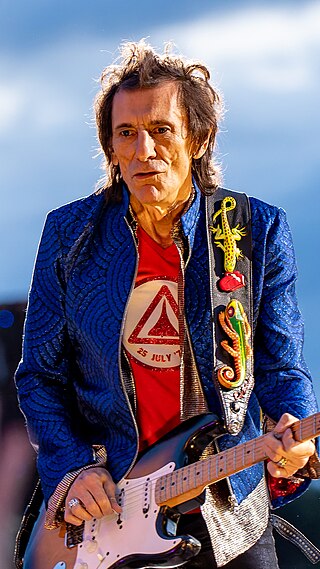
Ronald David Wood is an English rock musician, best known as an official member of the Rolling Stones since 1975, as well as a member of Faces and the Jeff Beck Group.

John Douglas "Jon" Lord was an English keyboardist and composer. In 1968, Lord co-founded the hard rock band Deep Purple, and he became regarded as its leader in the early years. Lord performed on most of the band's most popular songs; he and drummer Ian Paice were the only continuous members in the band between 1968 and 1976, and also from when it was re-established in 1984 until Lord's retirement in 2002. He also spent time in the bands Whitesnake, Paice Ashton Lord, the Artwoods, the Flower Pot Men and Santa Barbara Machine Head.

Pretty Things were an English rock band formed in September 1963 in Sidcup, Kent, taking their name from Bo Diddley's 1955 song "Pretty Thing", and active in their first incarnation until 1971. They released five studio albums, including the debut The Pretty Things and S. F. Sorrow, four EPs and 15 UK singles, including the Top 20 UK Singles Chart "Don't Bring Me Down" and "Honey I Need". They reformed later in 1971 and continued through to 1976 issuing three more studio albums, and reformed once again from 1979 to 2020 releasing another five studio albums finalising with Bare as Bone, Bright as Blood.
John Charles Edward Alder, also known as Twink, is an English drummer, actor, singer, and songwriter who was a central figure in the English psychedelic and proto-punk movement.

The Birds were an English rhythm and blues band, formed in 1964 in London. They recorded fewer than a dozen songs and released only four singles.
Tomorrow were an English musical group active in the 1960s, whose music touched on psychedelic rock, pop and freakbeat. Despite critical acclaim and support from DJ John Peel, who featured them on his "Perfumed Garden" radio show, the band was not a great success in commercial terms. They were among the first psychedelic bands in England, along with Pink Floyd and Soft Machine. Tomorrow recorded the first John Peel show session on BBC Radio 1 on 21 September 1967. The band included Keith West of "Excerpt from A Teenage Opera" fame on vocals and Steve Howe on guitars, who would later join the British progressive rock band Yes.

Colosseum are an English jazz rock band, mixing blues, rock and jazz-based improvisation. Colin Larkin wrote that "the commercial acceptance of jazz rock in the UK" was mainly due to the band. Between 1975 and 1978 a separate band Colosseum II existed playing progressive rock.
The Creation are an English rock band, formed in 1966. Their best-known songs are "Making Time", which was one of the first rock songs to feature a guitar played with a bow, and "Painter Man", which made the top 40 on the UK Singles Chart in late 1966, and reached No. 8 on the German chart in April 1967. It was covered by Boney M in 1979, and reached the No. 10 position on the UK chart. "Making Time" was used in the film Rushmore, and as the theme song from season 2 onwards of The Great Pottery Throw Down.
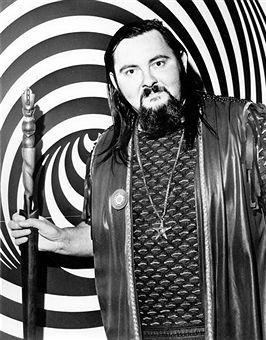
Graham John Clifton Bond was an English rock/blues musician and vocalist, considered a founding father of the English rhythm and blues boom of the 1960s.
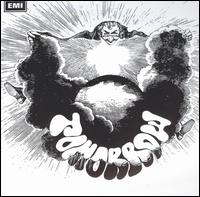
Tomorrow is the only studio album by the English psychedelic rock band Tomorrow. It was originally released in 1968 by EMI Parlophone in the U.K. in a black and white sleeve. A slightly different version of the album was also released in the U.S. in 1968 by Sire Records, one of the first releases on that label. Although it was not a success when it was first released, it is now widely regarded as one of the best psychedelic rock albums ever made.
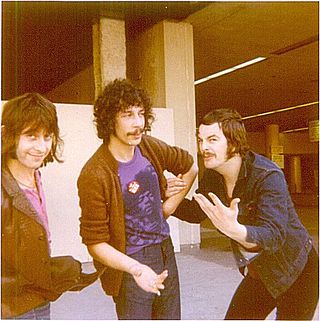
Ashton, Gardner and Dyke were a British rock trio, most popular in the early 1970s. They are best remembered for their song, "The Resurrection Shuffle", a transatlantic Top 40 one-hit wonder in 1971.
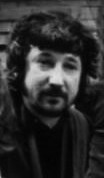
Richard Edwin Morrissey was a British jazz musician and composer. He played the tenor saxophone, soprano saxophone and flute.
The Artwoods were a British rhythm and blues band who formed in 1963 and were professionally active between 1964 and 1967. They were a popular live attraction, rivalling groups such as the Animals, although, despite releasing a clutch of singles and an album, their record sales never reflected this popularity.

Edward Anthony Ashton was an English rock pianist, keyboardist, singer, composer, producer and artist.
Kim Gardner was an English musician.
Arthur Wood was a British blues, pop and rock singer, who led The Artwoods in the 1960s and subsequently became a graphic artist. He was the brother of Ronnie Wood of The Rolling Stones.
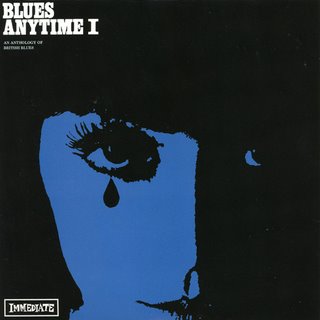
Blues Anytime: An Anthology of British Blues is a series of compilation albums featuring tracks from various British blues artists. Three volumes were released by Immediate Records in 1968, followed by Blues Leftovers in 1969.
The Fairies were a British rhythm and blues band led by drummer John 'Twink' Alder, who recorded three singles between 1964 and 1965.
References
- ↑ "Woodwork 1966". The Woodworks. Retrieved 15 September 2024.
- ↑ Biography by Bruce Eder at allmusic.
- ↑ White Boy Blues liner notes, Castle Communications, 1985.